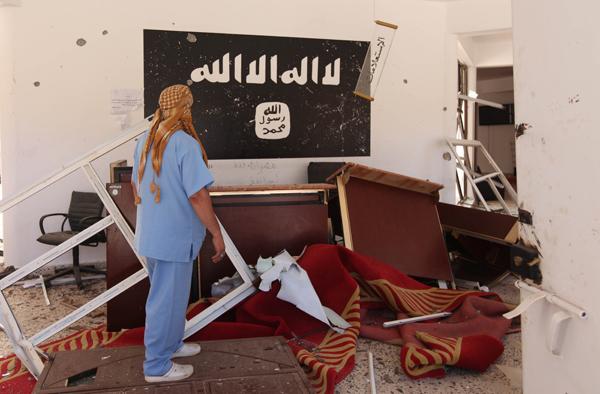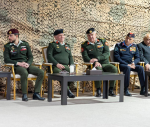You are here
Libyan forces push into last Daesh-held areas of Sirte
By AFP - Aug 28,2016 - Last updated at Aug 28,2016
SIRTE, Libya — Forces loyal to Libya's UN-backed unity government on Sunday pushed into the last areas of Sirte held by the Daesh terror group in what was the extremists’ coastal stronghold.
The battle for the hometown of Libya's slain dictator Muammar Qadhafi was launched more than three months ago by forces loyal to the Tripoli-based Government of National Accord (GNA).
Daesh captured the Mediterranean city in June 2015, sparking fears they would use it as a launchpad for attacks on Europe.
Earlier this month, the pro-GNA forces seized the extremists’ headquarters in Sirte, pinning them down in a small downtown area near the sea.
"Our forces entered the last areas held by Daesh in Sirte: district number one and district number three," a spokesman for the pro-GNA forces said on Sunday.
"The final battle for Sirte has started," Reda Issa said of the city 450 kilometres east of Tripoli.
About 1,000 pro-GNA fighters were taking part in the offensive, he said.
An AFP photographer saw several tanks and armed vehicles move towards district number one and heard gunfire and rocket explosions as they entered the northern neighbourhood.
"Fierce street battles" were taking place with pro-GNA forces using weaponry including heavy artillery, the photographer said.
At least 25 loyalists were killed Sunday and 120 wounded, a field hospital for the pro-GNA forces said.
The AFP photographer saw several wounded loyalists being evacuated to the field hospital.
The bodies of two Daesh extremists lay on a street inside district number one, he said, adding that black smoke was rising from both districts.
The pro-GNA forces said on Facebook the offensive came “after air strikes overnight” and as they pressed the assault the extremists countered with car bombs.
“The Daesh gangs committed mass suicide today when they sent five car bombs and a suicide bomber to try and stop our advancing forces,” a statement said without elaborating.
Since August 1, US warplanes have backed the assault to expel Daesh from Sirte, and as of August 24, they had carried out 82 strikes, according to the US Africa Command.
The AFP photographer reported no air strikes on Sunday.
The pro-GNA forces fought their way into Sirte on June 9 and two months later seized the extremists’ headquarters at the Ouagadougou conference centre.
But their advance has been slowed by snipers, suicide bombings and booby traps.
Loyalist forces are mostly militias from western cities that have sided with the unity government of prime minister-designate Fayez Al Sarraj and the guards of oil installations that Daesh has repeatedly tried to seize.
Ahead of Sunday’s assault, they prepared their tanks for inspection, cleaned their weapons and deployed on the outskirts of Sirte and around the two districts.
“I’m cleaning my weapon... and getting it ready for the decisive battle,” one fighter, Osama Mohammad Mosbah, told AFP.
“We hope that God will help us defeat them,” he said of Daesh.
Snipers on roofs
Sirte had been tense but calm since Thursday.
But fighting erupted Saturday on the edges of district number one between the extremists and loyalist forces armed with machine guns and rocket launchers, the AFP reporter said.
Pro-GNA snipers deployed on the roofs of buildings whose facades were still painted with the extremists’ black flag, and used binoculars to scan their surroundings for IS fighters.
More than 370 pro-GNA fighters have been killed and nearly 2,000 wounded in the battle for Sirte since May, according to medical sources. Daesh casualty figures are unavailable.
Analysts say that ousting the extremists from Libya would be a symbolic boost for the country’s fragile unity government but not an end to unrest in the North African nation.
Daesh could launch more scattered attacks across Libya, they say.
The extremist group took advantage of chaos in Libya since the 2011 uprising that toppled and killed Qadhafi, where rival militias and authorities have vied for control of the oil-rich country.
A UN-brokered deal struck in December led to Sarraj’s unity government taking office in the capital, but it has since struggled to fully assert its authority.
The presidential council headed by Sarraj said on Wednesday it would present a new Cabinet line-up in an attempt to secure the backing of parliament.
The legislature, which rejected a previous unity government in a vote on Monday, gave the council a “final chance” and 10 days to propose a new Cabinet.
Related Articles
SIRTE, Libya — Libya's pro-government forces on Monday cornered Daesh extremists in their last holdouts in the coastal city of Sirte, after
TRIPOLI — Air force units of Libya's unity government launched an operation Saturday to cut off potential escape routes for extremists holed
TRIPOLI — Fighters of Libya's unity government, backed by US air strikes, have recaptured more ground from extremists holed up in the centre
















